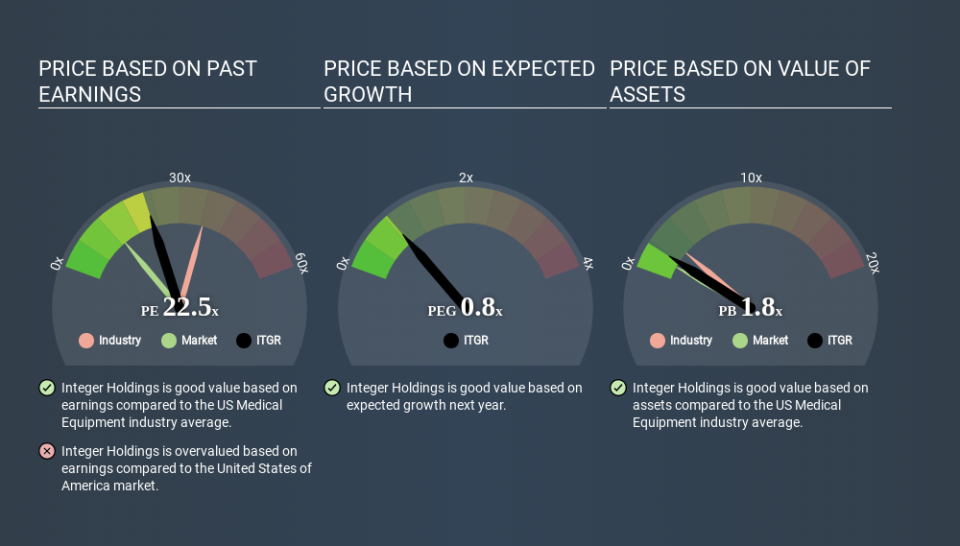How Does Integer Holdings's (NYSE:ITGR) P/E Compare To Its Industry, After The Share Price Drop?

To the annoyance of some shareholders, Integer Holdings (NYSE:ITGR) shares are down a considerable 30% in the last month. The recent drop has obliterated the annual return, with the share price now down 18% over that longer period.
All else being equal, a share price drop should make a stock more attractive to potential investors. In the long term, share prices tend to follow earnings per share, but in the short term prices bounce around in response to short term factors (which are not always obvious). So, on certain occasions, long term focussed investors try to take advantage of pessimistic expectations to buy shares at a better price. Perhaps the simplest way to get a read on investors' expectations of a business is to look at its Price to Earnings Ratio (PE Ratio). Investors have optimistic expectations of companies with higher P/E ratios, compared to companies with lower P/E ratios.
See our latest analysis for Integer Holdings
Does Integer Holdings Have A Relatively High Or Low P/E For Its Industry?
Integer Holdings's P/E of 22.48 indicates relatively low sentiment towards the stock. We can see in the image below that the average P/E (38.6) for companies in the medical equipment industry is higher than Integer Holdings's P/E.
Its relatively low P/E ratio indicates that Integer Holdings shareholders think it will struggle to do as well as other companies in its industry classification. Since the market seems unimpressed with Integer Holdings, it's quite possible it could surprise on the upside. If you consider the stock interesting, further research is recommended. For example, I often monitor director buying and selling.
How Growth Rates Impact P/E Ratios
Earnings growth rates have a big influence on P/E ratios. When earnings grow, the 'E' increases, over time. Therefore, even if you pay a high multiple of earnings now, that multiple will become lower in the future. A lower P/E should indicate the stock is cheap relative to others -- and that may attract buyers.
Integer Holdings's 90% EPS improvement over the last year was like bamboo growth after rain; rapid and impressive. Even better, EPS is up 51% per year over three years. So we'd absolutely expect it to have a relatively high P/E ratio.
A Limitation: P/E Ratios Ignore Debt and Cash In The Bank
Don't forget that the P/E ratio considers market capitalization. That means it doesn't take debt or cash into account. Hypothetically, a company could reduce its future P/E ratio by spending its cash (or taking on debt) to achieve higher earnings.
Such spending might be good or bad, overall, but the key point here is that you need to look at debt to understand the P/E ratio in context.
So What Does Integer Holdings's Balance Sheet Tell Us?
Integer Holdings has net debt equal to 39% of its market cap. You'd want to be aware of this fact, but it doesn't bother us.
The Bottom Line On Integer Holdings's P/E Ratio
Integer Holdings's P/E is 22.5 which is above average (13.1) in its market. Its debt levels do not imperil its balance sheet and its EPS growth is very healthy indeed. So on this analysis a high P/E ratio seems reasonable. What can be absolutely certain is that the market has become significantly less optimistic about Integer Holdings over the last month, with the P/E ratio falling from 32.3 back then to 22.5 today. For those who don't like to trade against momentum, that could be a warning sign, but a contrarian investor might want to take a closer look.
Investors have an opportunity when market expectations about a stock are wrong. If the reality for a company is better than it expects, you can make money by buying and holding for the long term. So this free report on the analyst consensus forecasts could help you make a master move on this stock.
Of course, you might find a fantastic investment by looking at a few good candidates. So take a peek at this free list of companies with modest (or no) debt, trading on a P/E below 20.
If you spot an error that warrants correction, please contact the editor at editorial-team@simplywallst.com. This article by Simply Wall St is general in nature. It does not constitute a recommendation to buy or sell any stock, and does not take account of your objectives, or your financial situation. Simply Wall St has no position in the stocks mentioned.
We aim to bring you long-term focused research analysis driven by fundamental data. Note that our analysis may not factor in the latest price-sensitive company announcements or qualitative material. Thank you for reading.



